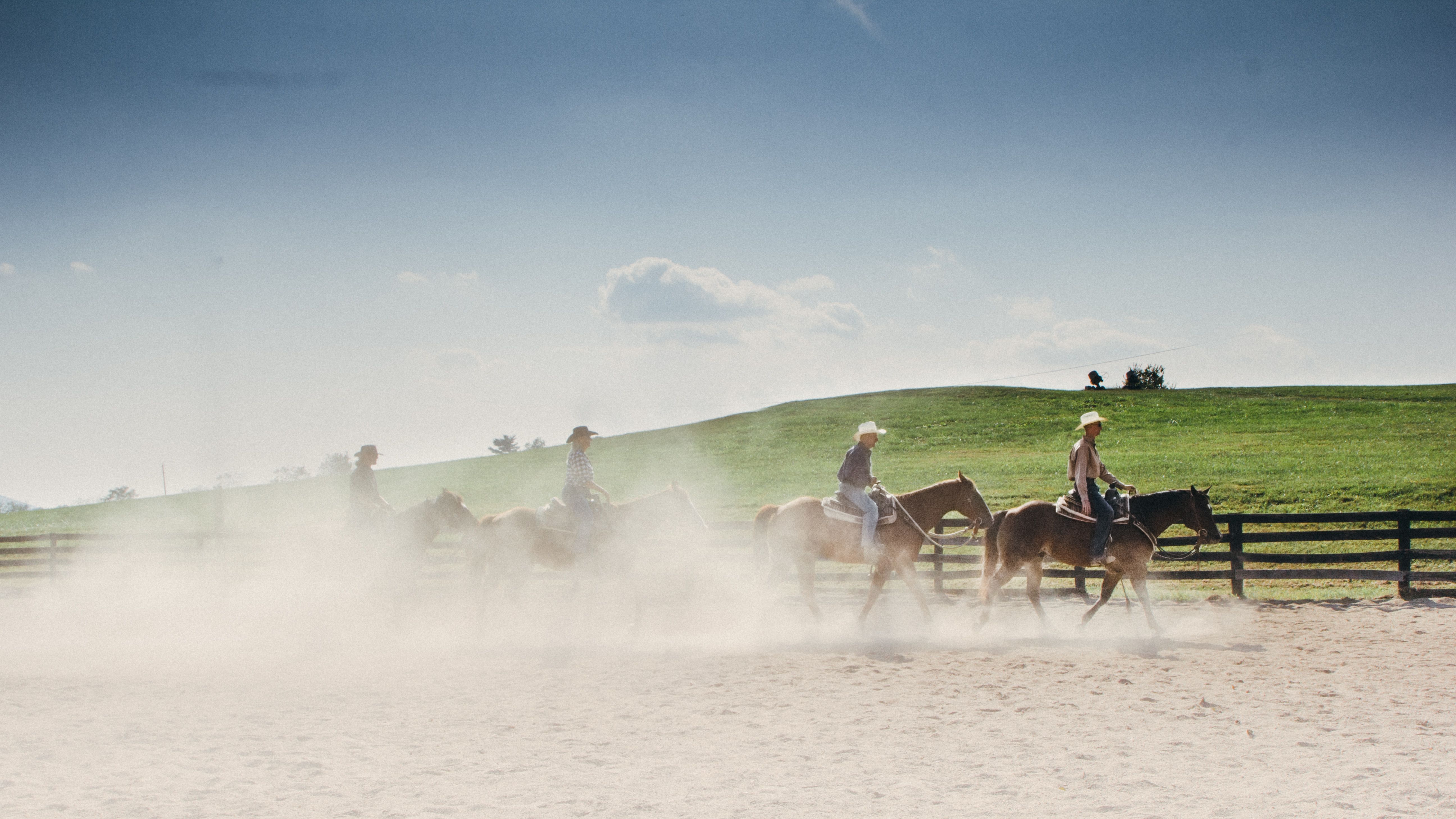Our Commitment to Sustainability
Feeling a renewed purpose and sense of responsibility, we founded Schulz to provide a positive, more sustainable impact within the equine industry.


If you’ve read my story on how the Schulz 1912 collection came to be, you’ll know that what started as one of the most devastating fires we had ever faced, sparked a new trajectory for my journey as a rider.
When the Woolsey fires destroyed my childhood home and barn, among those of so many others in our community, it was overwhelming. While we were touched by the outpouring of aid and support, it was a humbling moment to see such ruin and loss that could never be completely reversed.
It was during the aftermath that I realized doing my part to preserve the environment would require a commitment greater than my own daily lifestyle choices. This meant building environmental sustainability and an eco-consciousness into the DNA of my professional work. In my art practice, I’ve been drawn to land art and land artists, studying its whole history and focusing on making work in collaboration with the land without being harmful.
The same mindset and consideration has also spilled into my life as an equestrian. Feeling a renewed purpose and sense of responsibility, I founded Schulz to provide a positive, more sustainable impact within the equine industry.
At this point, we don’t have an option on whether we want to be sustainable or not. It’s something that every brand needs to be right now, because we are in such a critical moment.
Building a company with a sustainable mission at the forefront is an inherently imperfect journey, but our promise to you is this: diligence in our decisions and transparency in our actions.
Here is where we are at.
A deep-rooted consideration for the earth
I am grateful to have been brought up in a home and community culture that has put the preservation of the environment at the forefront. With each lifestyle choice, I recognize the privilege I have in being able to opt for more sustainable practices—from buying from local farms and avoiding ingredients like palm oil that have horrific effects on the environment, to using compostable trash bags and locally made skincare products.
At Schulz, we approach each business and product decision with the same deep inquiry and passion to do the right thing for the earth. David Riley, my partner at Schulz, is a veteran bagmaker and was part of the team at Lowepro, one of the first companies to make a bag out of recycled material back in the early 2000s. Pete Hill, our design lead, brings extensive knowledge in performance wear from his time at Arc’teryx, The North Face, and more.
Overall, our team brings an incredible background in developing bags with lifetime warranties, choosing recycled materials and sustainable alternatives, and creating optimized designs that limit the amount of factory waste. I’m honored to collaborate with a group of people so unified by this vision.
A sustainable vision for the product
One of the first sources of inspiration for the 1912 Collection were antiques and vintage products—items that would last and that weren’t intentionally designed to break down prompting further purchases. These bags are going to be taken to the barn, to horse shows, and wherever our horses may go. It’s inevitable that they’ll get dirty and mucked up, so they need to be rugged enough to withstand a variety of environments and even a good washing. When designing this collection, our guiding lights were longevity and durability: bags that won’t end up in landfills after a few wears.
As we started building out the material story, we were fueled by the numerous options out there, going down rabbit hole after rabbit hole to research different materials and processes. Here is where we really got to understand the holistic story of these bags and their true imprint.
We are currently experiencing the tricky balance of providing our riders with what they need, while also being environmentally responsible. The thing with riding is that everything’s made of leather: our saddles, bridles, halters, boots, and more. It’s a material that does truly stand the test of time. Of the utmost importance is making sure that whatever material alternative there is, it must perform just as well as its original. With longevity (and staying out of landfills) the top priority, we have opted to use ethically sourced, vegetable-tanned leather for our debut collection.
That being said, we are energized by peer companies like DeNiro boots that are working with vegan leather. At present we are continuously testing alternative materials, like plant-based leathers from cactus, pineapple, apple, and mycelium. Also fascinating is the potential for lab-grown leathers and other cutting edge technologies that can create identically sound materials without the environmental impact and animal harm of traditionally sourced leather. In all, our ultimate goal is to be 100% leather free in our future collections once we have identified materials that prove just as durable and trustworthy.
Sustainably sourced materials and ethical partnerships
We source our materials from bluesign® certified facilities that eliminate harmful substances, engage renewable energy, and minimize waste. Each textile and material treatment is carefully tracked to ensure sustainable sourcing and production: no contaminants, heavy metals, or animal dyes.
In addition to our ethically sourced, vegetable tanned leather, we are looking into recycled nylons from fishnets collected from shipyards, so they don’t end up out in the ocean when they go out of service.
In all, our factory partners are part of the team. We value their expertise and welcome their advice on improving processes to create an end product that has a minimal impact on the environment, maintains optimal durability in use, and does not compromise our ability to sustainably retire each material at the end of its life.
A life cycle that keeps the Schulz Collection out of landfills
We mean it when we say we make bags with lifetime warranties. The Schulz 1912 Collection is built to last through all your equine endeavors and beyond—with each component able to be easily fixed or replaced, instead of having to toss the whole bag.
As part of our commitment to keep our products out of landfills, Schulz also offers a comprehensive trade-in and recycling program. If, for any reason, you are ready to say goodbye to your 1912 bag, we’ll gladly take it back so we can properly recycle each component, or pass along to another equestrian for reuse. As a thank you for doing your part, we’ll also send you credit equivalent to the value and condition of your bag.
Continued learning and constantly iterating on our sustainability efforts
Our inquiry does not stop with this first collection. Just as in our equine sports, we hold high standards for the work we do and how we show up in our industry. Beyond our team, Schulz has connected with a network of consultants who are at the forefront of sustainability and climate change activism.
As we continue product development, we look up to leaders like Marci Zaroff of MetaWear and Zem Joaquin of Near Future to stay abreast of the latest innovations in eco-fashion, sustainable alternatives for materials and textiles, as well as environmentally friendly manufacturing processes.
We are also in constant conversation with my dear friend Julia Jackson, founder of Grounded, an organization focused on addressing the climate crisis. Julia continues to remind me that the future of this planet as a whole will be determined by what happens in these next ten years.
Julia pointed us to the work of Paul Hawken and the Drawdown Project, whose mission is to urgently yet equitably aid the world towards the point of “drawdown” where the level of greenhouse gases in the atmosphere stop climbing and start to decline. We further resonate with Hawken’s efforts and identity in the space as both an entrepreneur and environmentalist—it is absolutely possible to do good and inspire change with our own platforms. Following our passions at work does not have to be at odds with environmental responsibility. While we strive to do our part where we can in our own business practices, we look to champion the work of others doing such important work; for this reason, a portion of our profits will be donated to the Paul Hawken's latest initiative, Project Regeneration.
I share these details with you not to self-congratulate, but to respect your right to know where your products are coming from, how they are made, and the culture you are supporting when you choose the Schulz Collection for your equestrian bags. We look to create in collaboration with our community, and our doors are always open for your questions, comments, and ideas. Thank you.
